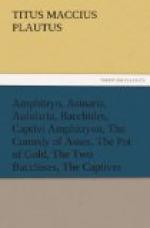Quod bene fecisti referetur gratia id
quod postulas;
et id et aliud, quod me orabis, impetrabis.
atque te
nolim suscensere quod ego iratus ei feci
male.
You have been kind to us, sir, and I shall be glad to do as you ask; both that request, and any other, will be granted. (embarrassed) And—and I trust you won’t be incensed at me for getting angry and treating him badly.
Philocr.
Quid fecisti?
(anxiously) What did you do?
Hegio
In lapicidinas compeditum condidi,
ubi rescivi mihi data esse verba.
I had him fettered
and put down in the stone quarries when I
found out I had
been imposed upon.
Philocr.
Vae misero mihi,
propter meum caput labores homini evenisse
optumo.
God forgive me!
To think of the splendid fellow suffering
so, and all for
my sake!
Hegio
At ob eam rem mihi libellam pro eo argenti
ne duis.
gratiis a me, ut sit liber, ducito.
Well, sir, this
being so, you needn’t give me a single
farthing for him:
take him from me gratis—he is a free man.
Philocr.
Edepol, Hegio.
facis benigne. sed quaeso, hominem ut
iubeas arcessi.
Well, well, Hegio,
many thanks! But have him sent for, I beg
you.
Hegio
Licet. ubi estis vos? ite actutum Tyndarum huc arcessite, 950 vos ite intro. interibi ego ex hac statua verberea volo erogitare, meo minore quid sit factum filio. vos lavate interibi.
By all means (calling to slaves in house) Where are you? [ENTER OVERSEERS] Quick! go bring Tyndarus here. [EXEUNT OVERSEERS] (to Philopolemus and Philocrates) As for you lads, step inside. Meanwhile I want to inquire of this whipping post here (pointing to Stalagmus) what was done with my younger son. You can take a bath meanwhile.
Philop.
Sequere hac. Philocrates, me intro.
Come along in with me, Philocrates.
Philocr.
Sequor.
Certainly. [EXEUNT.
V. 2.
Scene 2.
Hegio
Age tu illuc procede. bone vir, lepidum mancupium meum.
(to Stalagmus)
Come now, you! Over there with you,
(pointing)
my good sir, my charming piece of property.
Stal.
Quid me oportet facere, ubi tu talis vir
falsum autumas?
fui ego bellus, lepidus. bonus vir numquam,
neque frugi bonae,
neque ero umquam, ne erres: spem
ponas me bonae frugi fore.
(sullenly) What can you look for from me, when a fine gentleman like you tells lies? I’ve had my day as a dandy, a charmer; a good sir, or good for anything, I never was, and I never will be, make no mistake, don’t you build up hopes I will be good for anything.
Hegio




